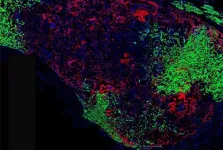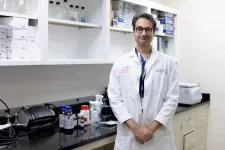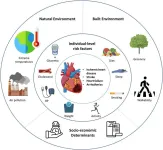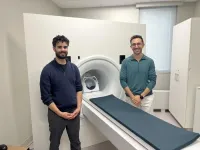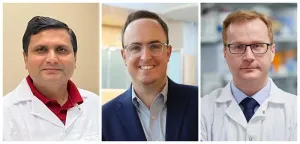(Press-News.org) University of Liverpool researchers have secured £2.66m Medical Research Council funding to clinically test a novel immunotherapeutic strategy for non-small cell lung cancer – one of the most deadly cancers.
Professor Christian Ottensmeier, and Professor Natalia Savelyeva from the Institute of Systems, Molecular and Integrative Biology are collaborating with industry partner Genomics England and working closely with Touchlight Genetics Ltd to develop a vaccine therapy for patients with non-small cell lung cancer who have not had sufficient benefit from standard immunotherapy.
Non-small cell lung cancer is the most common type of lung cancer, with almost 50, 000 new diagnoses each year. It is the third most prevalent cancer in the UK and, globally, it is estimated that there were 2.2million new cases in 2020 alone.
Professor Christian Ottensmeier, the chief investigator on the clinical trial and a Consultant in Medical Oncology at The Clatterbridge Cancer Centre NHS Foundation Trust, said: “In this new trial we will make a personalised cancer vaccine for each patient. We want to train the patient’s own immune system by targeting mutations in patients’ individual cancer. We think that this approach could help where standard immunotherapy is not sufficient. This is the case for the majority of patients with lung cancer, where the immune system has not been effective at recognising the cancer cells – we call these tumours ‘immune cold’.”
Professor Natalia Savelyeva added: “Cancer vaccines hold the promise to turn ‘immune cold’ cancers into ‘immune hot’ cancers and if successful could help more than 50% of patients with advanced lung cancer and potentially also patients with other cancers. We are very excited to develop this trial and look forward to making the vaccines available to the patients with non-small cell lung cancer that are seen in our region and at The Clatterbridge Cancer Centre NHS Foundation Trust.”
The team will use the funding to develop the trial to rapidly create personalised ‘doggybone DNA’ vaccines for patients, whose cancer is not benefiting sufficiently from standard immunotherapy. Doggybone DNA production – so called as the produced DNA is shaped like a dog’s bone – involves replication of a DNA using enzymes in a test tube. Compared to standard DNA vaccine production the doggybone approach is more cost effective and, significantly, is quicker when creating personalised genetic medicine.
Dr Helen Horton, Chief Research Officer, Touchlight Genetics Ltd said: “We are very excited to work with Profs Ottensmeier, and Savelyeva. The doggybone DNA technology provides an ideal means to deliver rapid individual personalised vaccines to this large group of patients with an unmet clinical need and other patients with solid cancers.”
The funding was secured through the Development Pathway Funding Scheme (DPFS) and the team were supported through the bid process by the University’s IP Commercialisation team, who work with academics to realise the social and economic benefits of University technologies. The DPFS drives Medical Research Council funded research along the developmental pathway to enable clinical use, patient benefit and commercialisation.
END
University secures £2.66M to develop personalized cancer treatment
2023-09-13
ELSE PRESS RELEASES FROM THIS DATE:
Natural compound found in plants inhibits deadly fungi
2023-09-13
A new study finds that a natural compound found in many plants inhibits the growth of drug-resistant Candida fungi — including its most virulent species, Candida auris, an emerging global health threat. The journal ACS Infectious Diseases published the discovery led by scientists at Emory University.
Laboratory-dish experiments showed that the natural compound, a water-soluble tannin known as PGG, blocks 90% of the growth in four different species of Candida fungi. The researchers also discovered how PGG inhibits the growth: It grabs up iron molecules, essentially starving the fungi of an essential nutrient.
By starving the fungi rather than attacking ...
Study reveals why cancer may spread to the spine
2023-09-13
The vertebral bones that form the spine are derived from a distinct type of stem cell that secretes a protein favoring tumor metastases, according to a study led by researchers at Weill Cornell Medicine. The discovery opens up a new line of research on spinal disorders, helps explain why solid tumors so often spread to the spine, and could lead to new orthopedic and cancer treatments.
In the study, published Sept. 13 in Nature, the researchers discovered that vertebral bone is derived from ...
Research empirically shows structural discrimination negatively impacts LGB youth and adults
2023-09-13
“This study provides evidence that supports the belief of researchers and advocates that national policies protecting the human rights of lesbian, gay and bisexual people have an impact on individual development,” University of Delaware Assistant Professor Eric K. Layland said. “For LGB people, many of these identity and social milestones occur during the critical developmental period of adolescence. Results of this study add to other research showing protective policy can benefit LGB health by ...
UTHealth Houston study: Unruptured brain aneurysms may be missed in routine clinical care, but AI-powered algorithm can help
2023-09-13
Unruptured cerebral aneurysms of sizes and locations that require attention may be frequently missed in routine clinical care, but a machine learning algorithm could minimize missed care opportunities, according to a new study from UTHealth Houston.
The research, published today in Stroke: Vascular and Interventional Neurology, was led by senior author Sunil A. Sheth, MD, associate professor in the Department of Neurology with McGovern Medical School at UTHealth Houston, as well as co-first authors Hyun Woo Kim, MD, vascular and interventional neurology fellow at UTHealth Houston, and ...
Electrifying vehicles in Chicago would save lives, reduce pollution inequities
2023-09-13
If the Chicago region replaced 30% of all on-road combustion-engine vehicles — including motorcycles, passenger cars and trucks, buses, refuse trucks and short- and long-haul trucks — with electric versions, it would annually save more than 1,000 lives and over $10 billion, according to a new Northwestern University study.
The new study, which simulates air quality at a neighborhood scale, also found that areas with predominantly Black, Hispanic and Latinx residents would benefit most.
The study underscores the potential of electric vehicles (EVs) to improve ...
Noted experts present detailed evidence on the impact of environmental issues on cardiovascular health
2023-09-13
Philadelphia, September 13, 2023 – There is already robust evidence that people living with cardiovascular disease are disproportionately affected by poor air quality and extreme temperatures, in large part due to climate change, the greatest threat to human health of the 21st century. In this special theme issue of the Canadian Journal of Cardiology, published by Elsevier, noted experts comprehensively review how climate change occurs and increases the risk of cardiovascular disease and provide practical tips on how to become a climate-smart cardiovascular healthcare provider.
Not long ago, climate change was a fringe topic deemed only ...
Western researchers use AI to predict recovery after serious brain injury
2023-09-13
Two graduate students from Western University have developed a ground-breaking method for predicting which intensive care unit (ICU) patients will survive a severe brain injury.
Matthew Kolisnyk and Karnig Kazazian combined functional magnetic resonance imaging (fMRI) with state-of-the art machine learning techniques to tackle one of the most complex issues in critical care.
Whether it is the result of a stroke, cardiac arrest or traumatic brain injury, lives can forever be changed by a serious brain injury. When patients are admitted to the ICU, families are faced with tremendous uncertainty. Will my loved one recover? Are they aware of what is going on? Will they ever be the same ...
Flu: Interferon-gamma from T follicular helper cells is required to create lung-resident memory B cells
2023-09-13
BIRMINGHAM, Ala. – During a bout of influenza, B cells interact with other immune cells and then take different paths to defend the body. One path is the B cells that differentiate into antibody producing cells. Another path is the B cells that differentiate into lung-resident memory B cells, or lung-BRMs, that are critical for pulmonary immunity.
Unlike antibody-producing B cells that help fight the current infection, the long-lived, non-circulating lung-BRMs migrate to the lungs from draining lymph nodes. ...
Three University of Oklahoma faculty receive National Institutes of Health funding to maximize their research
2023-09-13
For the first time in one year, three faculty at the University of Oklahoma have received Maximizing Investigators’ Research Awards from the National Institutes of Health.
The recipients are Gallogly College of Engineering faculty Vivek Bajpai, Ph.D., John R. Clegg, Ph.D., and Stefan Wilhelm, Ph.D. The highly competitive five-year, $1,866,485 grants will support their ambitious research programs without the need to recompete for funding throughout the duration of their awards.
Bajpai, an assistant professor in the School of Sustainable Chemical, Biological and Materials Engineering, will lead the project, “Epigenetic and Transcriptional ...
UNIST, DGIST, and POSTECH consortium selected for 2023 ITRC Project in ‘Quantum ICT’ sector!
2023-09-13
The consortium, comprising of UNIST, DGIST, and POSTECH has been chosen for the esteemed 2023 University ICT Research Center Project (ITRC) by the Ministry of Science and ICT (MSIT). This prestigious selection recognizes their expertise in the ‘Quantum Information and Communication Technologies‘ sector. The consortium aims to develop advanced quantum technologies while nurturing exceptional master’s and doctorate-level talents. With a total funding amounting to 8.25 billion won—7.5 billion won from government subsidies—the project spans eight years.
The kick-off meeting held at UNIST on August ...
